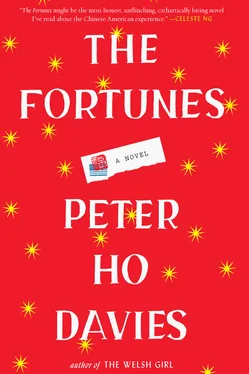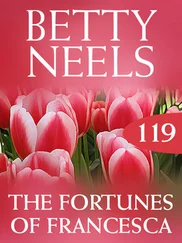When in Rome, she thinks. And in fact his penis, resting on his testicles as if on a pillow, is exactly the proportion of Greek and Roman statuary she’s seen in the museums of Europe. The ideal of male beauty. His torso is as hairless as those statues too, smooth and cool to the touch.
He stirs beneath her. But she’s not in Rome, she thinks with a smirk.
“What?” he asks.
“Nothing. I was just thinking, I’ve finally come home.”
But he doesn’t get the double-entendre, and she doesn’t care to explain it.
“‘It’s a long journey and a lonely one,’” she quotes instead from Shanghai Express, sinking into him.
Beside her the needle rides the waves of the gramophone like a ship on a starlit sea. A fan spins endlessly on the nightstand. She feels dizzy.
MARLENE
As Tiger Lily she’d kissed Betty Bronson as Peter Pan (the movie inheriting the stage convention of Peter being played by a woman) on the cheek.
But it was her first time with a woman.
“So?” Marlene bobbed her bare shoulders. “It’s my first time with a Chinese.”
On the vanity, two still champagne coupes, lipstick-printed. It was Berlin, the golden twenties; everyone was daring something, and she’d always been fashionable. Still, she swore Dietrich to secrecy.
“But of course, darling. We have to have secrets, so we can tell when we’re acting.”
“Self-combed women” was how her father referred to lesbians.
When the rumors got out anyway, Marlene made a little moue. “So? Now the public will just know what great actresses we are.”
Later she asks herself, Is that why I did it? All the scandalous behavior, the lesbian lovers, the white lovers, to distinguish myself from the characters I played. Or to copy them?
And were the lesbian rumors, she wonders, the reason she could never marry?
ANNAS
There are real whores, she has heard, back in Chinatown who style themselves after her, with funny names like Anna May Well and Anna Mae East.
Anna May. Anna Might. Anna Better.
Anna Won’t. Anna Don’t. “Anna—!”
They bob their hair like hers, dress like her, pose like her. Some are quite convincing lookalikes. Once, years ago, a young man stopped her in the street for a moment, took her arm, called her by name.
“Do I know you?”
“It’s John,” he said. “Jake.” But then his friend pulled him away, flashed a badge.
“Excuse him. He’s confused. Thought you were someone else.”
“Someone he loved?” she ventured, searching the fellow’s face.
“Someone he lost.”
His friend pulled him away. “Jeezamarooni,” she overheard. And, “I think that was the real McCoy!” And, “C’mon, Jake. It’s Chinatown.”
Her father always said she looked like a whore. She wants to stamp her foot: “No. They all look like me! ” But really, is that better or worse?
In Shanghai, it’s said, there are fifty thousand taxi dancers and sing-song girls, mostly in the French Concession. She’s fascinated. “I played a Shanghai prostitute, after all. I’m famous for it.” She asks Newsreel to take her one night to the “flowery world,” as it’s politely called. “In the spirit of research. Besides, I can practice my French.”
“I guess some stereotypes are true,” she says archly as their car slides through the night streets under the bare plane trees. Girls call out to the car. “Perhaps they all are in a nation of five hundred million.”
“Just not the only truth,” he offers, leaning forward to draw the curtains.
The too-sweet smell of warm rot rises off the river as they cross a bridge.
He takes her to a club, at her insistence, so that she can see the taxi dancers. He has joined her for tea dances at her hotel — he possesses a smooth, sauntering foxtrot — but he won’t dance with her here. Over the brassy strains of “yellow music,” the local jazz, she tells him she’s shocked by how many white prostitutes there are alongside the Chinese. They glow even paler in the light of the ballroom spotlight.
“Russians,” Newsreel explains, tamping a cigarette on his case. He has added a one-point pocket square to his suit, she sees, and a pair of celluloid sunglasses. Their tinted round lenses make her feel she’s still looking into his camera.
“I didn’t think there were that many foreigners in Shanghai.”
He shakes his head. “Very popular with Chinese men too.”
“Really? Do you ever come here?” she asks him. She wants to refold the handkerchief in a triple crown and tuck it back in place, patting his heart.
He ducks his head to light his cigarette, his oiled, combed hair sleek as a ’78. “In Chinese, the expression is ‘driving a nail.’” He illustrates by swinging an invisible hammer.
Behind him the saxophone player raises his instrument to his lips as if swigging from a giant bottle.
She is fast becoming a type herself, a type unto herself. “The Anna May Wong type,” reads the stage direction for a character in a late Pearl Buck radio drama.
DIM SUM
In Hong Kong, perhaps drunk, perhaps feeling the strain, she forgets that the birdcage microphone is on, insults the delegation that comes out to welcome her. A near-riot ensues. A banner proclaiming her “the flower of film” is torn down. Garlands are crushed underfoot; their heavy scent rises over the jostling crowd.
Chicken! the mob bays (in Cantonese now, so she knows they’re calling her a whore). Rotten cunt!
It’s Newsreel who pulls her away and hustles her into a cab.
“Thank you,” she tells him. For just a moment she had seen he was torn, debating whether to keep filming.
“It’s nothing. I’ve been in worse scrapes. In this business you learn to move fast. To protect your camera.” He cradles it in his lap. “I’m sorry,” he says.
“For what?”
“The mob. The name-calling.”
“Oh, that. I’ve been calling myself names since I was ten.”
“Nicer ones, I hope.”
The taxi hurtles through the streets, scattering bicycles.
She sings a little ditty to herself.
“What’s that?” Newsreel asks.
“Just a silly number I used to perform at parties: Anna May Wong / From Olde Hong Kong / She Can’t Be Wrong! ”
“I didn’t know you’d been to Hong Kong before,” he says politely.
“I haven’t.”
He offers her a cigarette, snaps his lighter in her face, snips it closed.
“They say you got your nickname in Jinan,” she tells him, exhaling. “Covering the massacre?”
He nods.
“I saw that footage. Two thousand Chinese civilians, by the Imperial Japanese Army.” She shakes her head. “And now you’re filming me.”
Outside, coppery light filters through the banyans. In the breeze their leaves shimmer like sequins on a dress.
Subsequently she is warned by the Nationalist authorities not to travel inland to see her father until tempers cool. He is warned not to receive her, on pain of deportation.
Her friend and costar in several pictures, Warner Oland, is also in town. He played her father, Fu Manchu, in Daughter of the Dragon years earlier, and still calls her daughter (though when he played her coercive lover in Shanghai Express he observed, “This is all getting a bit incestuous, no?”). If she can’t see her real father, she tells Newsreel glibly, she’ll settle for her movie father. The show must go on.
But she hopes Oland will help her too. He is the star of the Charlie Chan series, the most popular movies in China, and has been feted on his own tour, despite — an irony that pierces her to the quick — playing his most famous role in yellowface; he’s a Swede, among friends goes by Jack, short for his real name, Johann. But the Chinese don’t seem to mind, or even to notice. They love Charlie Chan, as a positive portrayal of a Chinese, no matter by whom, and in Oland’s case it doesn’t hurt that he stays in character for interviews and appearances, answering to “Mr. Chan” and speaking of his pleasure “at visiting home of venerable ancestors.” My bloody line, she thinks viciously.
Читать дальше












